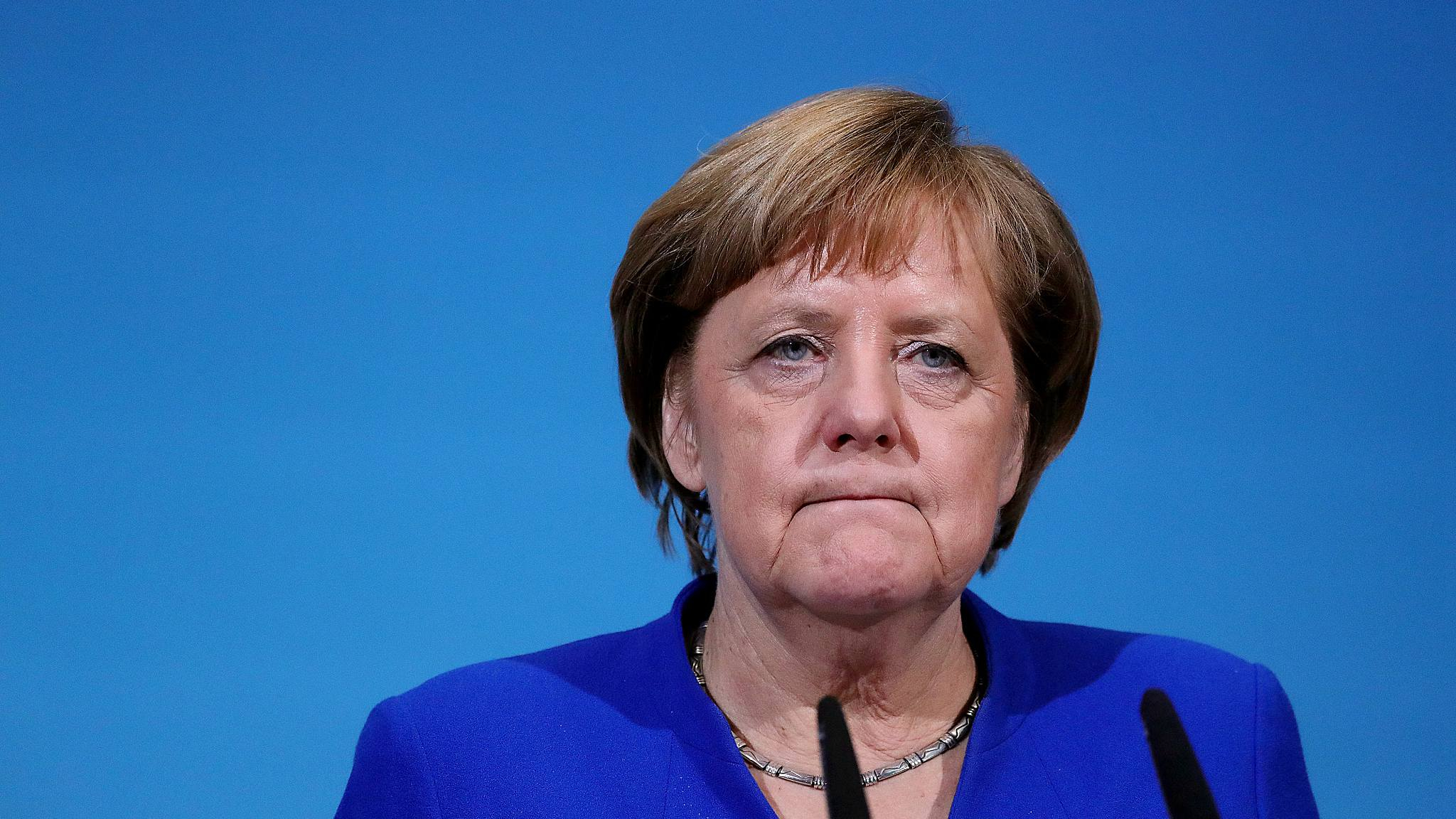Editor's note: This article is based on an interview with Liu Mingli, the deputy director of the Institute of European Studies at the China Institute of Contemporary International Relations. The article reflects the expert's opinion, and not necessarily the views of CGTN.
Angela Merkel has called time on her own tenure. The politician who has been Germany's chancellor for 13 years said on Monday that she decided not to seek re-election as the chair of her party the Christian Democratic Union (CDU) in December. She will formally stand down as chancellor in 2021.
Merkel also stated she would also not run for chancellor if snap elections were called before 2021.
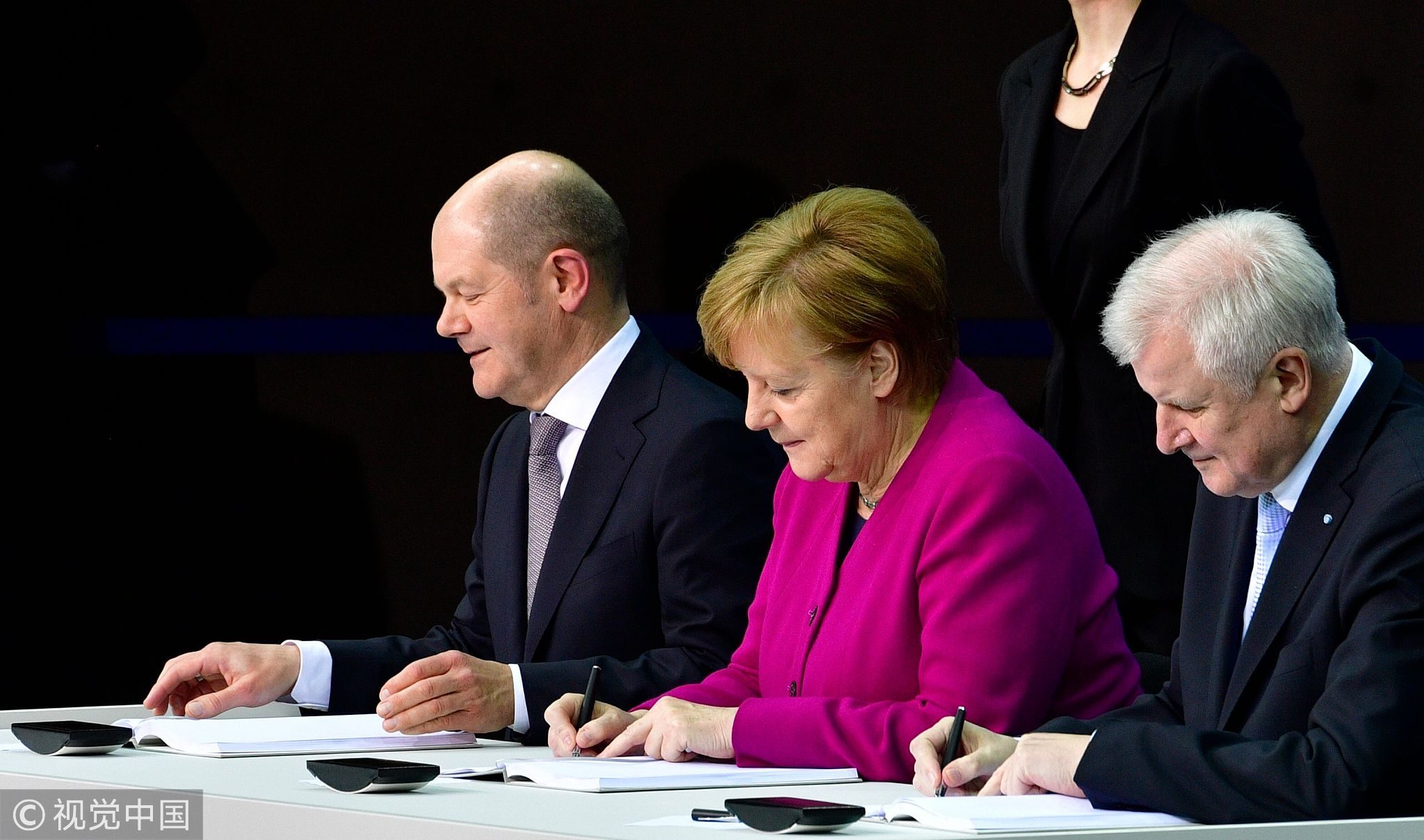
(L-R) Designated German Finance Minister and Vice-Chancellor Olaf Scholz of the SPD, German Chancellor Angela Merkel of the CDU and designated German Interior Minister Horst Seehofer of the CSU sign the coalition treaty to form a new government in Berlin, March 12, 2018. /VCG Photo
(L-R) Designated German Finance Minister and Vice-Chancellor Olaf Scholz of the SPD, German Chancellor Angela Merkel of the CDU and designated German Interior Minister Horst Seehofer of the CSU sign the coalition treaty to form a new government in Berlin, March 12, 2018. /VCG Photo
The announcement was no surprise. Speculation that she will step off the political stage has been rumored for months and now has risen to a new height after the latest election in the western state of Hesse on Sunday.
One in five voters deserted Merkel's CDU and her government partner, Social Democrats (SPD), leading to the worst result for CDU since 1966 and SPD since 1946. That came only two weeks after another similar blow for CDU's ally, the Christian Social Union, or CSU, in Bavaria.
Merkel's governing is far from smooth in the past six months after the formation of a government coalition in March. Ines Pohl, the editor-in-chief for German daily Die Welt, criticized the government as dominated by in-housing squabbling and "for the most part busy navel-gazing," that "hasn't led Germany but, rather, paralyzed the country."
The division on immigration policy remains a sticking point. Both CSU and SPD urged to take a tougher stance. Horst Seehofer, the interior minister and the head of CSU, threatened to resign if a deal cannot be reached.
However, Merkel remained a relatively open approach, though her open-door immigration policy in 2015 that brought more than one million refugees and harmed her popularity has been tightened in the past three years.
05:35
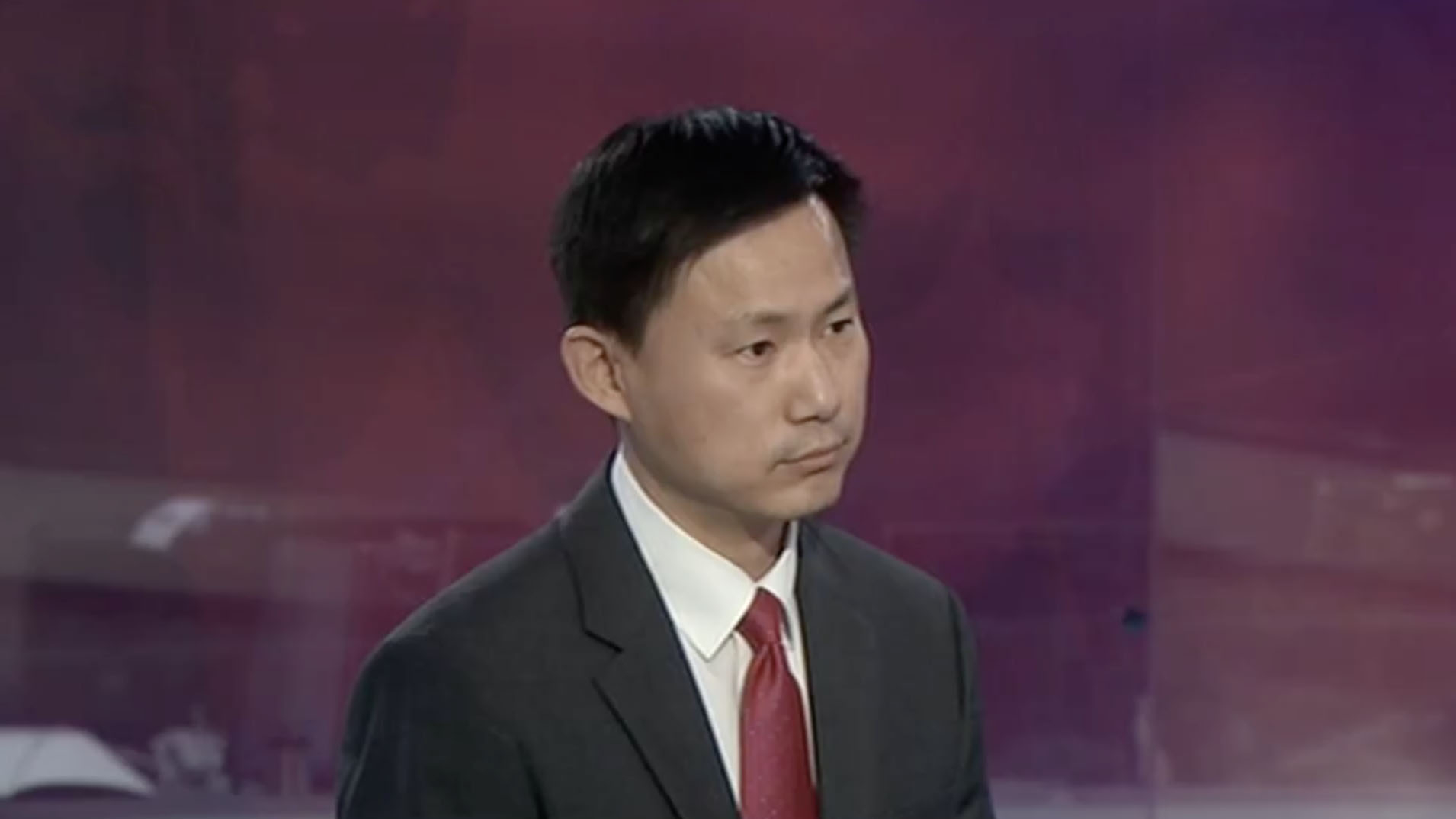
"The form of a government coalition took almost six months, that indicates a huge divergence between parties," Liu Mingli, the deputy director of the Institute of European Studies at the China Institute of Contemporary International Relations told CGTN, "their difference on immigration policy risks the stability of the coalition."
"Furthermore, voters of SPD have long argued the party's cooperation with CDU was a mistake, blaming Merkel's failure in responding the public's call on immigration and other social issues for a shrinking popularity of SPD. They believe it's better for SPD to pull off the coalition and reinvent itself as an opposition party, to gain ground for future elections," Liu added.
Apart from immigration, a widening gap in wealth inequality in German society is another headache for Merkel. The size of the lower-middle income group is enlarging although the country enjoyed a sound economy featured with a record low jobless rate and a steady growth in export.
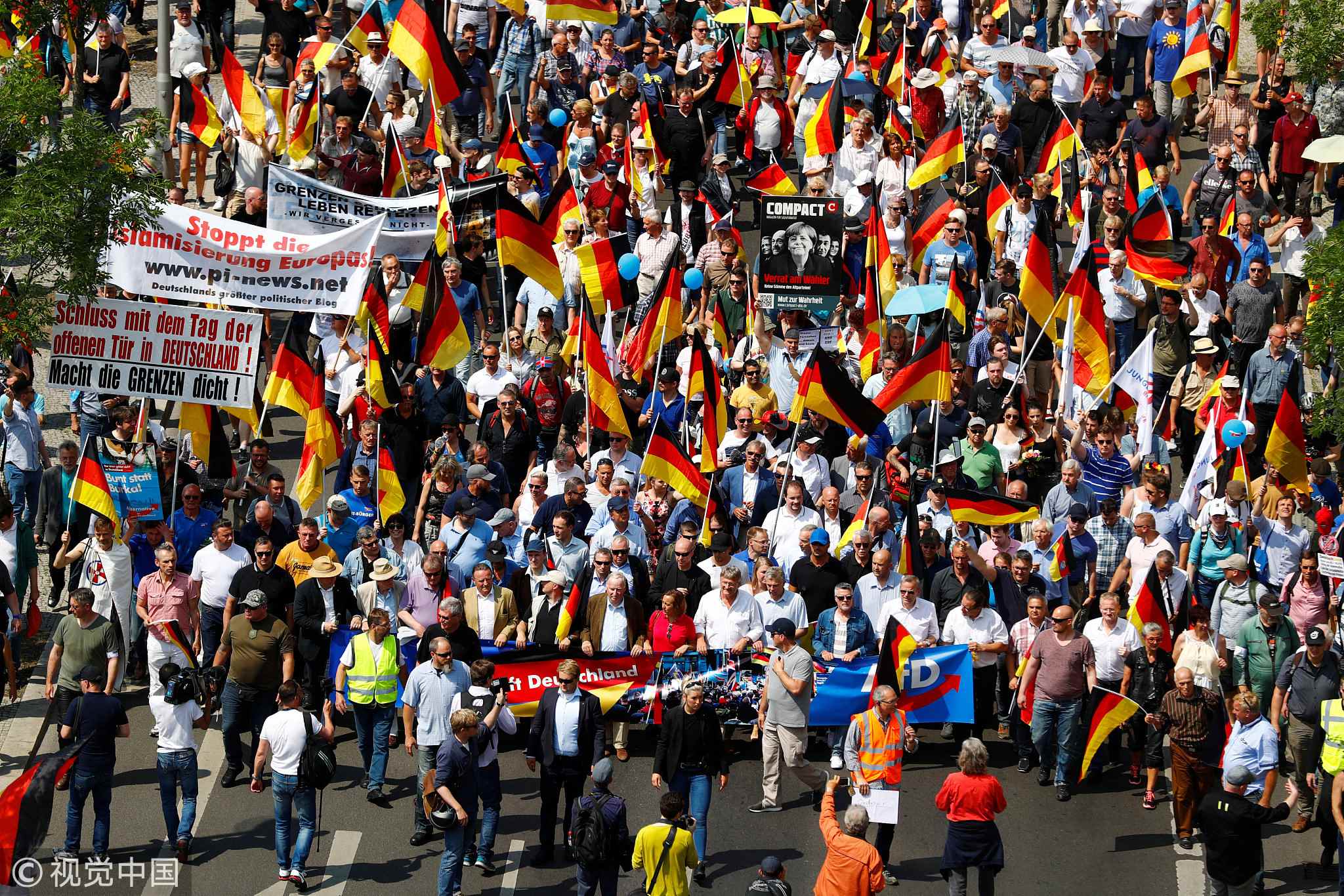
Supporters of the Anti-immigration party Alternative for Germany (AfD) hold German flags during a protest in Berlin, Germany, May 27, 2018. /VCG Photo
Supporters of the Anti-immigration party Alternative for Germany (AfD) hold German flags during a protest in Berlin, Germany, May 27, 2018. /VCG Photo
The political landscape is also changing. Populism is replacing pragmatism, not just in Germany, but in Europe and the world.
"People are turning their backs on traditional politicians. More and more opt to stand behind new faces what they believed can represent their voices. The rise of far-right Alternative for Germany party, or AfD, was an example," said Liu Mingli.
The recent two setbacks in local elections were the last straw for Merkel, pushing her to leave at an earlier date, as she said before becoming a chancellor, "I don't want to be a half-dead wreck when I leave politics."
Her decision, though not a surprise, is still a shock for Germany and the Europe Union.
Domestically, whether or not there will be severe changes depends very much on her successor at CDU. The name will be known after an election is held in December.
"No matter who takes up Merkel's position, the immigration policy in Germany will be further tightened, " said Liu Mingli, "her successor will reflect on Merkel's experience – she is such an influential leader in almost every front. The only flaw that forced her to leave is the open-door immigration policy."
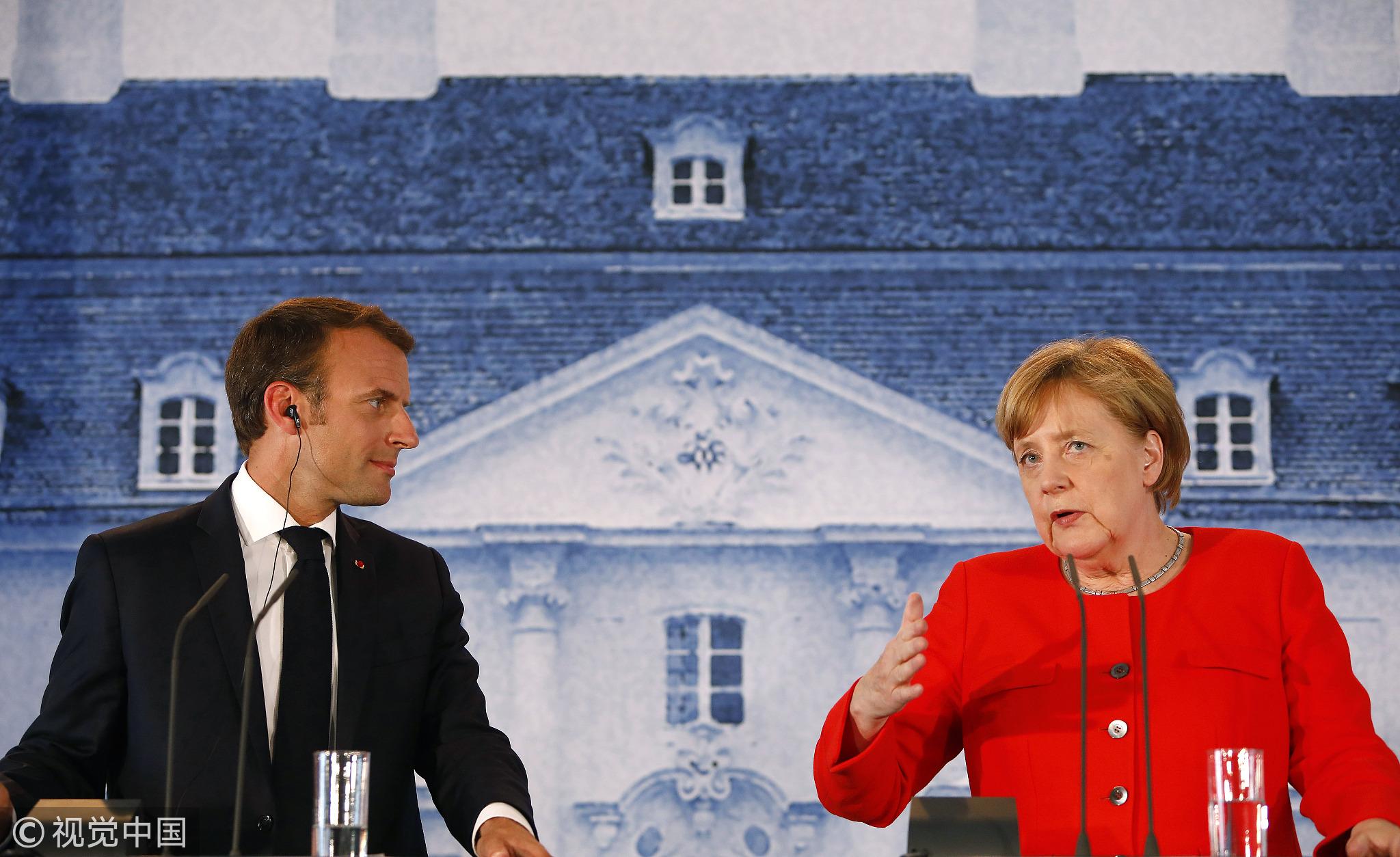
German Chancellor Angela Merkel and French President Emmanuel Macron address the media during a joint press conference at Schloss Meseberg presidential palace during German-French government consultations, June 19, 2018. /VCG Photo
German Chancellor Angela Merkel and French President Emmanuel Macron address the media during a joint press conference at Schloss Meseberg presidential palace during German-French government consultations, June 19, 2018. /VCG Photo
For the EU, where Merkel has been a de facto leader for more than a decade, the upcoming years will be full of uncertainties after her resignation. France and Germany have long been the two driving forces to keep the bloc on track, with the former more serving as a planner, the later as a leader and a supporter, especially economically.
The vision for Europe that Merkel is known for is not necessarily a quality of her successor. Without financial support from Germany, the reforms in EU will be difficult to proceed. The scene will be even worse at a time when the continent badly needs a leader when it faces a rise of populism, an imminent exit of Britain and a debt crisis that could be fueled by Italy's controversial budget plan.
Ready or not, the beginning of a post-Merkel era has come.
(Cover photo: Angela Merkel, Germany's chancellor, pauses during a news conference following overnight coalition negotiations, at the SPD headquarters in Berlin, Germany, January 12, 2018. /VCG Photo)
(If you want to contribute and have specific expertise, please contact us at opinions@cgtn.com)

